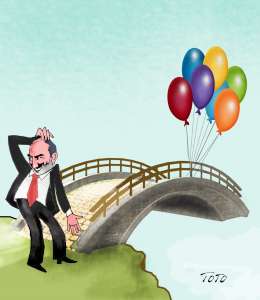 Prime Minister Nikol Pashinyan assumed power in May 2018 by riding on a wave of populism that he had generated.
Prime Minister Nikol Pashinyan assumed power in May 2018 by riding on a wave of populism that he had generated.
On September 22, he tried to extend the momentum of that populism to the diaspora, delivering a masterful speech in Los Angeles. His speech stretched beyond celebrating the 28th anniversary of the independence of Armenia, covering some fundamental issues affecting Armenia and Armenians around the world.
Although these days the Pashinyan administration’s revolving door of defections can compete with those of President Trump, betraying some instability at the helm, the prime minister was able to capture his audience through his charisma and seriousness of intent.
In the first place, his speech was a resounding tribute to the diaspora, acknowledging in detail endeavors to support Armenia’s revival. Perhaps he went too far, saying that without diasporan help, Armenia could not survive.
Then, he went on to build block by block the golden bridge that he wants to extend from Armenia to the diaspora and vice versa.
He expressed his gratitude for the humanitarian relief programs that the diasporan organizations have delivered to Armenia and turning the tables, he proposed to convert the humanitarian programs to “utilitarian” ones by investing in Armenia. Thus, his recommendation was “enrich Armenia and enrich yourselves.”
Touching on some sensitive issues, he tried to gloss over the dire situation of emigration, giving a positive spin to the movement.
He said that many citizens were forced to leave Armenia in order to seek gainful employment in different countries, to support their families back home.
His treatment of the issue of repatriation was also put in a positive light. His earlier contention asking for growth in Armenia’s population to five million had raised some eyebrows, therefore this time repatriation was formulated differently. Rather than anticipating or encouraging an inward migration, he extended the moral frontiers of Armenia around the globe, encompassing all ten million Armenians as virtual citizens of the homeland.
Then he further expanded on the issue of pan-Armenianism. Referring to his statement on August 5 in Stepanakert, he stated that no matter in what country Armenians reside, they have to support Armenia and Artsakh, but not at the expense of their host countries. They should feel duty-bound to improve and strengthen the friendly ties between those host countries and Armenia.
All in all, Pashinyan’s statement was well structured, offering credit and consideration to all contributions extended from the diaspora to Armenia. He certainly won the hearts of the majority.
Pashinyan’s populist approach won him tangible results in Armenia. He actually used that method to overthrow a well-entrenched regime and took over. But how effective this practice can prove to be in the diaspora remains to be seen. The diaspora does not have a government, it does not even have a structure that can hold the parts together. At best, Pashinyan’s hold on power can be a virtual one and that is of an ephemeral nature which can dissipate easily, if it is not nourished regularly. And that nourishment must be based on learning the true nature of the diaspora.
Thus far, the diaspora has been a cash cow for the Armenian government and that status was generated by naive patriotism on the part of the diaspora. But at this juncture, both parties have arrived at a more realistic approach that could serve as a sound basis on which the prime minister is hoping to expand.
This year, it was a novel idea by the Pashinyan administration to hold the independence celebrations in a depressed region of Armenia, namely Gyumri. Next year, and the year after, other regions will be highlighted. Yerevan’s growth came at the expense of the other regions. This policy aims to bring uniform development throughout the country.
At the end of his speech, he issued a challenge to Diasporan Armenians to come and celebrate the New Year in Armenia.
The response to this appeal may be a good yardstick to measure the impact of Pashinyan’s spirited speech. Edmond Y. Azadian















